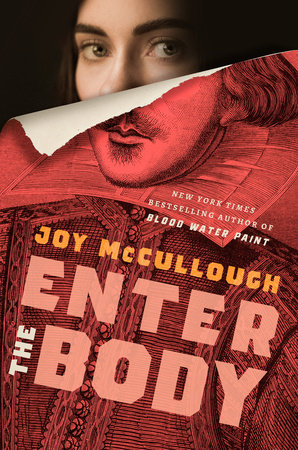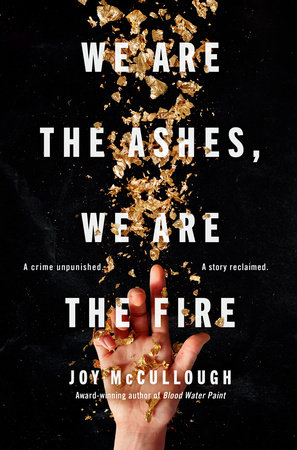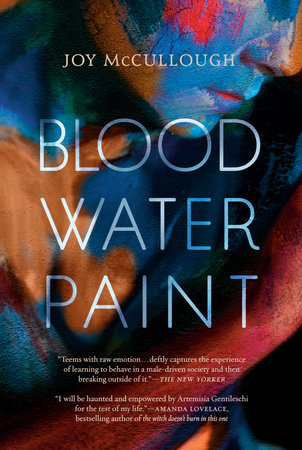
Everything Is Poison
Hardcover
$19.99
More Formats:
★ “Bracing…. Enrapturing…. This eloquent, rapid-fire novel is rich in cadence and history.”—Publishers Weekly, starred review
★ "Acclaimed author and playwright McCullough exquisitely reimagines her play La Tofana’s Poison Emporium into a historical teen novel that smoothly mixes in Italian history. Fans of McCullough’s Blood Water Paint (2018) will be enthralled to delve into another story that includes interspersed verse on the subject of 'giving women a choice over what happens to their bodies.' A must-read for those who embrace the #MeToo movement."—Booklist, starred review
"Everything Is Poison’s mixture of tenderness, brutality, loneliness, resignation, and joy makes for an intimate reading experience. Free-verse poems between prose chapters elevate the story and highlight the universal elements. An emotionally stirring celebration of women finding community."—Kirkus Reviews
★ "Acclaimed author and playwright McCullough exquisitely reimagines her play La Tofana’s Poison Emporium into a historical teen novel that smoothly mixes in Italian history. Fans of McCullough’s Blood Water Paint (2018) will be enthralled to delve into another story that includes interspersed verse on the subject of 'giving women a choice over what happens to their bodies.' A must-read for those who embrace the #MeToo movement."—Booklist, starred review
"Everything Is Poison’s mixture of tenderness, brutality, loneliness, resignation, and joy makes for an intimate reading experience. Free-verse poems between prose chapters elevate the story and highlight the universal elements. An emotionally stirring celebration of women finding community."—Kirkus Reviews
- Pages: 304 Pages
- Publisher: Penguin Young Readers Group
- Imprint: Dutton Books for Young Readers
- ISBN: 9780593855874
An Excerpt From
Everything Is Poison
Before that, though, Giulia reaches behind the counter and comes out with a broom. She hands it to her daughter without a word. Everything inside Carmela rebels, wants to scream out that she could have swept the shop front any time over all these years; that isn’t what she has earned with her patience. But this is her mother, La Tofana, with eyes of steel and spine to match, and this is a test.
Carmela takes the broom and begins to sweep.
Loitering in the archway, where she at least has a view of the inner sanctum, would be too obvious. But Carmela lingers longer than necessary, perhaps, behind the counter, where the shelving opens up to the back, allowing a glimpse. Maria usually works to one side of the arch, and Laura to the other, and at Giulia’s request, they hand things through to the front. But the shelves mostly obscure the customer’s view of what happens in the back and Carmela doesn’t manage to see much more than she has before.
By the time Maria and Laura arrive, the floor of the shop front is spotless. Carmela rushes over to check for any dirt they’ve dragged in. With her luck, they’ll be followed by a steady stream of customers and Carmela will be sweeping all day.
But this is a test, she reminds herself. She will be the best shop sweeper a store has ever known. She will pass this test, and then the next.
“Happy birthday, Carmela!” Laura’s voice is soft as always, but her eyes twinkle as she holds out a bundle wrapped in brown paper.
Maria says nothing, but squeezes Carmela’s shoulder as she moves past her to her spot along the worktable.
Carmela glances to her mother at the counter, bent over the inventory book. Perhaps she should keep sweeping, save the package for later. But her mother smiles and nods. “Open it,” she says.
Carmela sets the broom aside and tears into the paper, unable to stop the childish grin plastered across her face. The only gift she’s hoped for has been this right here, this chance to be included, but now she’s been given another.
Heavy green fabric unfolds into an apron like the ones Maria and Laura wear. But this one has beautiful vines and flowers embroidered along the edges.
“She’s been working on that forever,” Maria calls from the back.
Carmela trails her fingers over the beautiful needlework. “Oh Laura, it’s beautiful!”
Laura keeps her head down, never one for compliments, and comes to help Carmela tie the apron on.
“You didn’t have to do this,” Carmela says.
“It’s an important occasion,” Laura says.“Yes, but—”
The apron on, Laura looks Carmela up and down and nods. Then she moves through the archway to her regular spot.
“Wait, did you know?” Carmela follows Laura through the archway, almost without noting it, because now she needs to understand what’s happened here. “How did you know I’d start today?”
Laura looks bewildered. Behind Carmela, Maria speaks. “It was decided that you’d start on your sixteenth birthday, wasn’t it?”
“Yes, but . . .”Carmela glances at Giulia, still bent over the notebook where she keeps her records of sales and inventories. She doesn’t glance up, but a smile dances on her lips.
“I thought you’d all forgotten!”
Maria lets out a half laugh, half snort. “Well, we didn’t. Here you are.”
Here she is. In the back room of the shop, as though it isn’t something she’s been dreaming of since she could toddle around and be told no every time she drew near.
She takes in Maria’s workspace to the left—a disastrous whirlwind of ingredients and bottles and implements Carmela can’t make any sense of. To the right of the archway, the same ingredients and bottles and implements fill Laura’s space, but all in perfect order.
Laura smiles. “We’re very glad you’re here.
”Carmela allows herself a single, solitary twirl in her beautiful new apron. It’s childish, but she’s here now, and they can’t take it away from her.
She drinks in the rest of the back room. More shelves upon shelves of bottles and crocks and containers of all different shapes and sizes, filled with powders and liquids and leaves and roots. Not uniform, carefully labeled remedies, like out in the front, but raw ingredients. Mortars and pestles and empty bottles and paper packets to fill with custom remedies, crafted to a patient’s needs. A hearth with a fire Maria is coaxing into existence, a heavy cauldron on the kettle stand.
And everywhere, dried plants, hanging from every beam, making an upside--down forest Carmela wants to live in forever.
“It’s wonderful,” she says.
Maria grunts.
Giulia appears, inventory book in hand. She opens it to a list of ingredients and shows Carmela where to start. “Go through the inventory,” she instructs. “Mark anything that’s less than half full.”
The shop bell rings, and Giulia turns away, as though that is all the instruction Carmela will need.“But how will I know—”
“I have a customer,” Giulia says. “Ask Maria if you have any questions.”
Carmela is made of questions.
As customers flow in and out of the shop, she listens closer than she ever has before. She’s not spying now. She’s an apprentice. She’s supposed to learn what to do when a customer complains of toothache or stomach pain or a sleepless baby. Not only the remedies for the ailments, but the questions to ask, the tone to take, how to make them feel at ease.
She’s also supposed to check the inventory, which feels important at first, but quickly becomes drudgery. There are so many ingredients, and the writing on the labels is so tiny. Often they’re smudged into illegibility or there are no labels at all. Her mother and Maria and Laura don’t need labels; they simply open a bottle, take a sniff, and know what’s inside.
Many are familiar to Carmela: lavender, sage, lemon balm, chamomile. But some give her pause: bone splinters, nail clippings, powdered mummy, crocodile dung. When she reaches sanguis pulvis, it’s nearly empty. She pulls the jar from the shelf and peers inside. A dark red powder with a faint metallic smell.
She notes its low supply and starts to put it back on the shelf.
“Oh dear.” Giulia materializes behind her, holding a hand out for the jar. “That’s almost out.”“What’s it for?”
Giulia’s not listening. She’s carried the jar to another corner of the workshop.“Inciting the passion of a lover.” More incongruous words have never flown past Laura’s lips.
There it is: the line between what they do in here and what happens out there. Laura measures powder from a jar of sanguis pulvis, mixes it with whatever else a love potion contains, packages it, and Giulia sells it to a girl like Violetta, who then gets her happily ever after.
Giulia returns, frowning. “We’ve never run out before.”
“Everyone wants a love potion,” Laura says mildly. “I won’t begin for another two weeks.”
“Don’t look at me,” Maria says. But then she jerks her thumb at Carmela. “Have her courses started?”
Carmela knows her Latin well enough, but it takes a moment to make sense of “sanguis pulvis.” Powdered blood. “We use our own?”
“When your time comes, wring your rags into that crock there.” Giulia points beneath Maria’s workspace.
“Couldn’t you use . . . I don’t know, pig’s blood?”
Maria guffaws, but Giulia simply shakes her head. “Not unless you want to incite your lover’s passions for a pig.”
“If you ask me,” Maria laughs, “most lovers need their passions suppressed.”
“For the time being, Laura,” Giulia says, “let’s adjust the love potions? More rose water, a pinch more sorrel. Stretch the powdered blood.”
Carmela looks from face to face, expecting an objection. Changing a recipe on the fly—and a popular remedy at that. “But how do you know it will still work? Have you tried?”
“It’s a love potion,” Giulia says. “The ingredients don’t matter. It’s hope in a bottle.”
“That can’t be true, though. They work! Everyone says!”
Giulia settles on a stool, amused, giving Carmela the rope to hang herself. But there is no way the love potions are a fantasy. People who must make the choice between buying meat or vegetables spend precious coins on the prized potions. People who wouldn’t otherwise dare to cross La Tofana’s doorstep risk it to get their hands on those coveted bottles.
“Nina Santori bought a love potion and the next day Sandro asked for her hand.”
Giulia looks unimpressed.
“Penelope Strozzi says Victor was never going to speak to her again, and then the love potion melted his heart.”
Carmela realizes she sounds like a child, precisely at the moment she’s meant to be showing her maturity. But any citizen of Campo Marzio would object to the apothecary saying the love potions are worthless. It’s not her fault if she’s ignorant to the secrets of the shop. When there’s still no reaction, she unleashes the most obvious argument of all. “Violetta Raso thinks you’re a witch and still she came in here for a love potion!”
At that Giulia laughs. “Carmela, my love, everyone who walks through that door has said I’m a witch at one point or another. And none of those girls are your friends. Why are you listening to what they say?”
None of those girls are Carmela’s friends because of what they say. Because they believe, like everyone else in the neighborhood, apparently, that her mother is a witch. That by spending time with Carmela they’re doomed to become witches themselves. And yet they’ll turn to the witch to solve their problems.
“If the love potions are worthless, why are you taking people’s money for them? Isn’t that dishonest?”
This time Giulia doesn’t laugh. Laura stops grinding comfrey root to listen to her answer.
“When someone comes in here for hope in a bottle, I listen to them. I offer advice, if that’s what they want, but most of the time what they’re paying for is my listening ear.” Giulia stands and busies herself restocking ingredients that are cluttering Maria’s workspace. “And when they walk out the door with a pretty bottle that promises things will turn around, their newfound confidence is what makes it so. I think that’s worth a few coins, don’t you?”
Laura nods and turns back to her pestle.“Then why do you bother collecting your monthly blood? If it’s all pointless?”
“Because the blood also has other important uses.” The front door chimes and Giulia dusts off her apron, the discussion clearly over. Though right before she sails through the archway, she says over her shoulder, “Besides, the blood gives the love potions the perfect blush of pink.”






